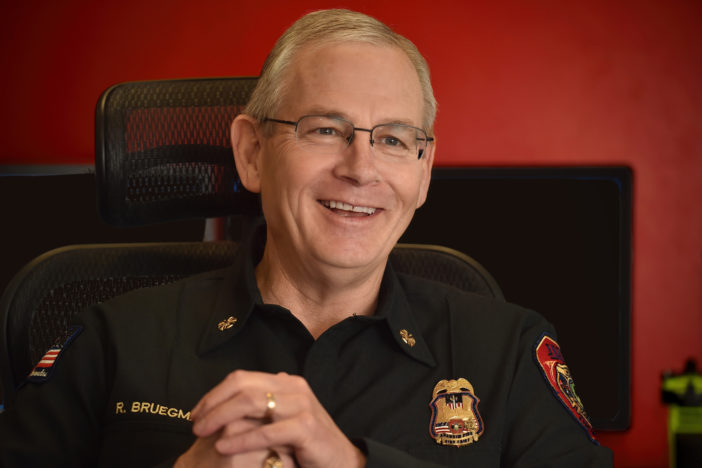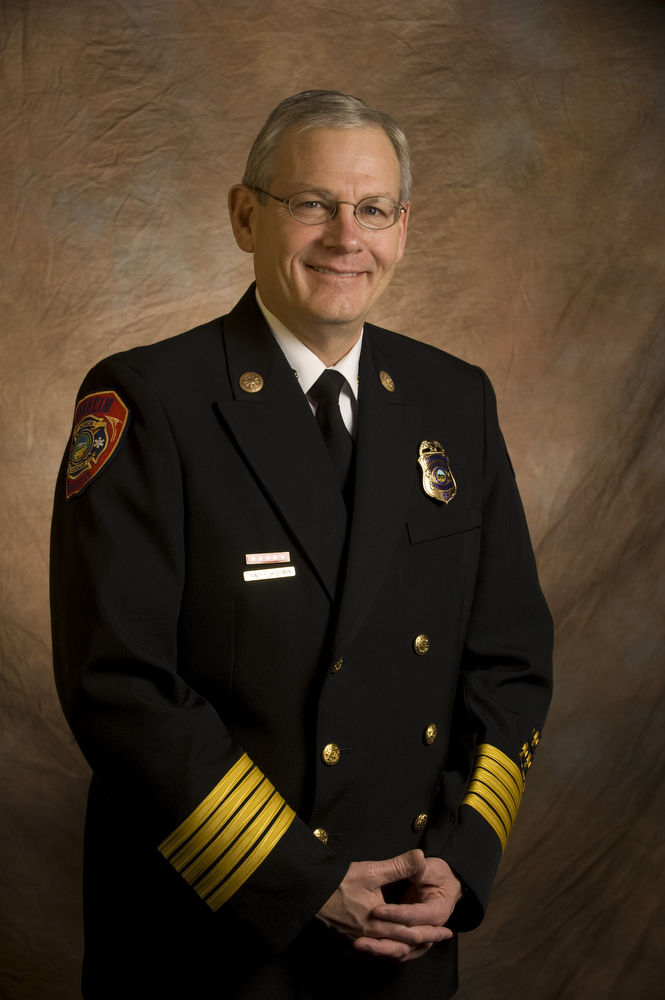At age 23, Randy Bruegman thought he was being kicked out of the fire academy.
Would-be firefighters from about six agencies were attending the academy in Colorado, all with hopes of becoming full-time firefighters.
But every week, at least one prospective firefighter was pulled out of class and never returned.

Anaheim Fire & Rescue Chief Randy Bruegman talks about his career at the fire department as his retirement date approaches.
Photo by Steven Georges/Behind the Badge
So, when Bruegman was called out of the room to meet with the assistant fire chief and the battalion chief, he thought his time in the academy was coming to an end.
“They must have seen the look on my face,” Bruegman said. “They said, you’re not getting fired. We brought you in here for other reasons.”
They thought Bruegman — not yet an academy graduate — could one day be a fire chief and encouraged him to first, keep focused on his probationary year, and second, make good career choices to help him reach that potential goal.
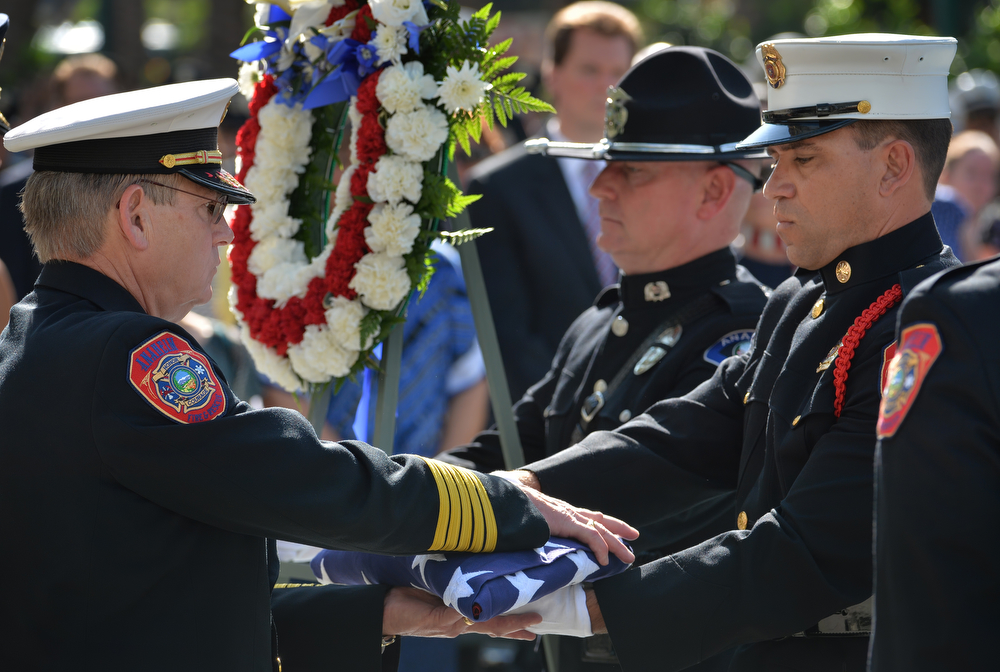
Anaheim Fire & Rescue Chief Randy Bruegman, left, receives the flag from Honor Guard Michel Bowidowicz during the 2015 9/11 Remembrance Ceremony at Anaheim Grand Plaza.
Photo by Steven Georges/Behind the Badge
Bruegman went back to the lecture hall that day and started a journey that would eventually bring him to Anaheim in 2010.
“I don’t know, if that seed had not been planted, if I would be sitting in this position,” Bruegman said, “but I think it created a pathway for me and a perspective, so that’s what I started to strive for early in my career.”
His career trajectory continued to climb. After a few years on the job, his fire chief, John Mulligan, encouraged Bruegman to seek out advancement opportunities. Bruegman landed his first chief job a couple years later.
“It led to the opportunity to lead five different organizations across the country,” he said. “That’s where it all started.”
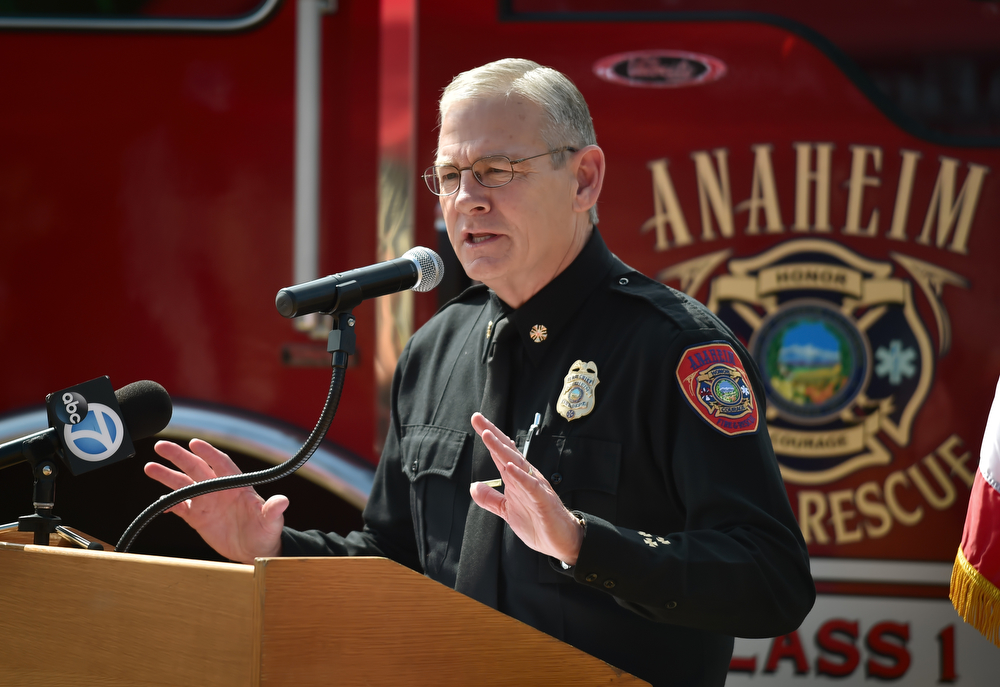
Anaheim Fire & Rescue Chief Randy Bruegman talks about the need for the new Fire Station 5 on La Palma Avenue while standing in front of Anaheim Engine 5 during the groundbreaking ceremony.
Photo by Steven Georges/Behind the Badge
Throughout his career, Bruegman has left a trail of innovation and growth at all his agencies. He’s helped improve other fire agencies through his work with the International Association of Fire Chiefs, serving as the president in 2002 to 2003, and with the Center for Public Safety Excellence (CPSE), serving as the commission chair from 1997 to 2000 for agency accreditation and as the board president for the organization from 2004 to 2017.
At his home agencies, Bruegman has promoted agency accreditations, education certifications, and credentialing for his personnel, as well as innovation. One such example was the creation of the Community Care Response Unit, which couples a Nurse Practitioner and a Paramedic, allowing patients with non-life-threatening issues to be treated at home — a type of innovation that helps to enhance a customer service-based culture that supports Anaheim’s initiative to be a City of Kindness.
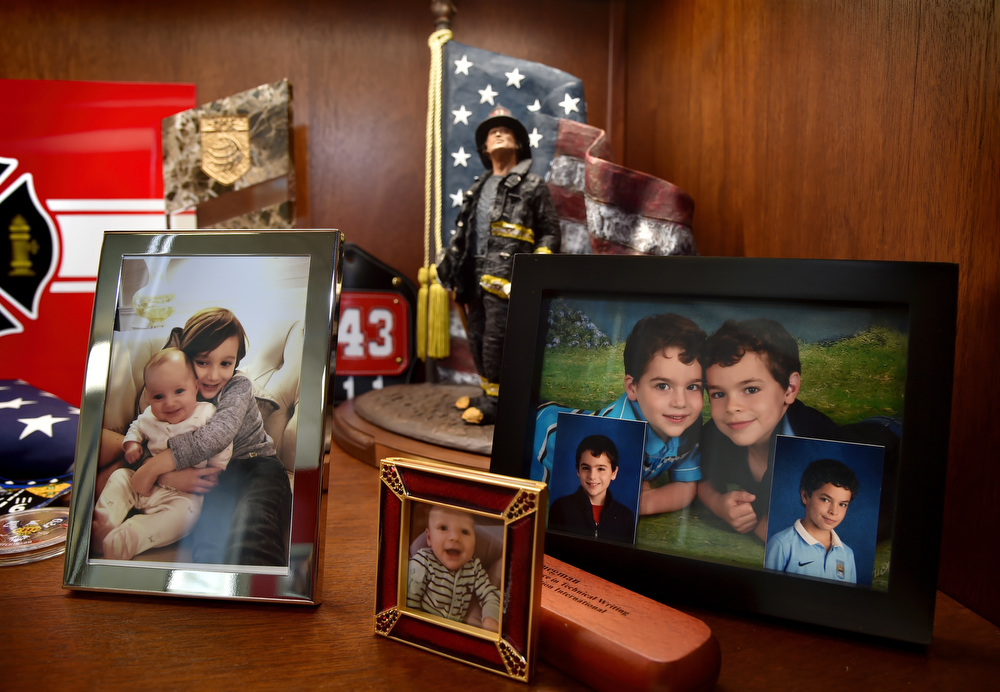
Photos that include Anaheim Fire & Rescue Chief Randy Bruegman’s grandkids sit on display in his office.
Photo by Steven Georges/Behind the Badge
Under Bruegman’s watch, Anaheim has also gained Class 1 status from the Insurance Service Office, which is the highest rating a city can earn and has the added benefit of reducing the cost of fire insurance for residents and businesses. In 2014, after a multiyear process requiring extensive evaluation of every aspect of Anaheim Fire & Rescue, the department received Fire Agency Accreditation.
“If you hope to improve any aspect of your operation, you have to measures that performance first,” Bruegman said. “And when you start to measure things you really start to look at it from that perspective… It really forces you to ask, ‘how can we do better?’ If you’re not measuring something it never gets better.”
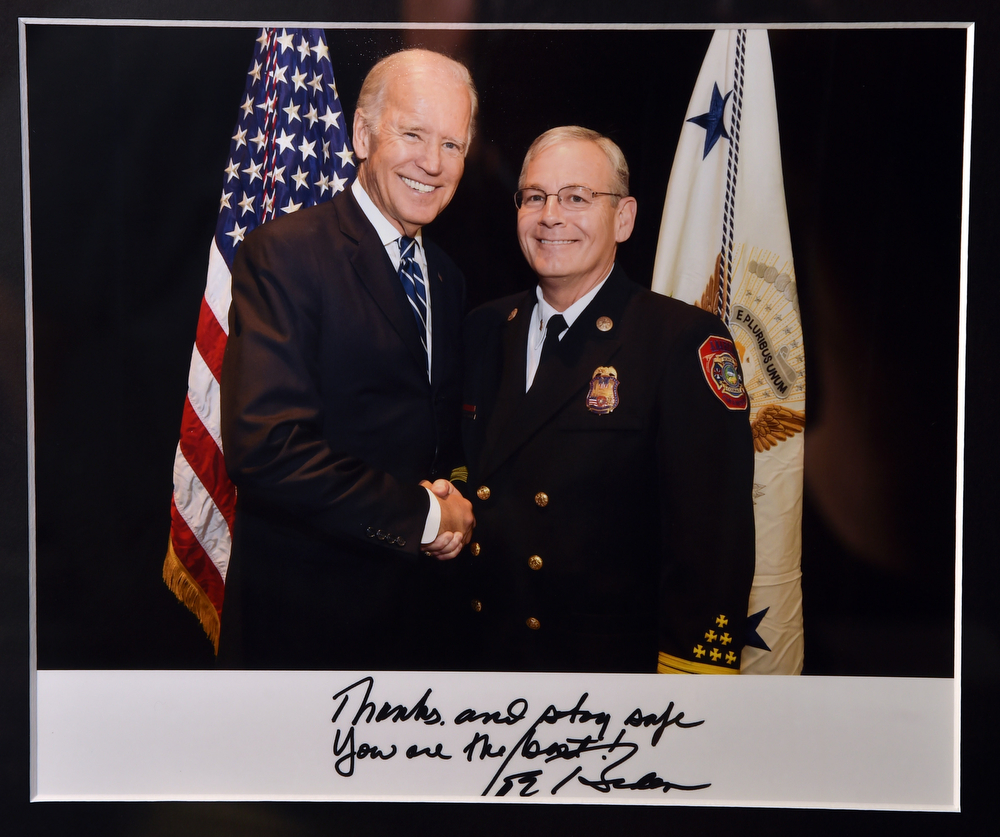
Anaheim Fire & Rescue Chief Randy Bruegman with then Vice President Joe Biden in 2016 is one of the photos on the wall of his office.
Anaheim Fire & Rescue is one of just 259 total accredited agencies. Currently, fewer than 80 agencies have achieved both a Class ISO rating and Agency Accreditation in the United States.
The agency has also bolstered its wildland fire preparedness – one of the city’s biggest risk areas – with both equipment and training. Anaheim Fire & Rescue now has five Type 3 wildland units, two Type 6 units, and a water tender (tanker) is being built, and is expected to be delivered in the spring of 2019.
“I’m very proud of what we have done with our wildland program,” Bruegman said.
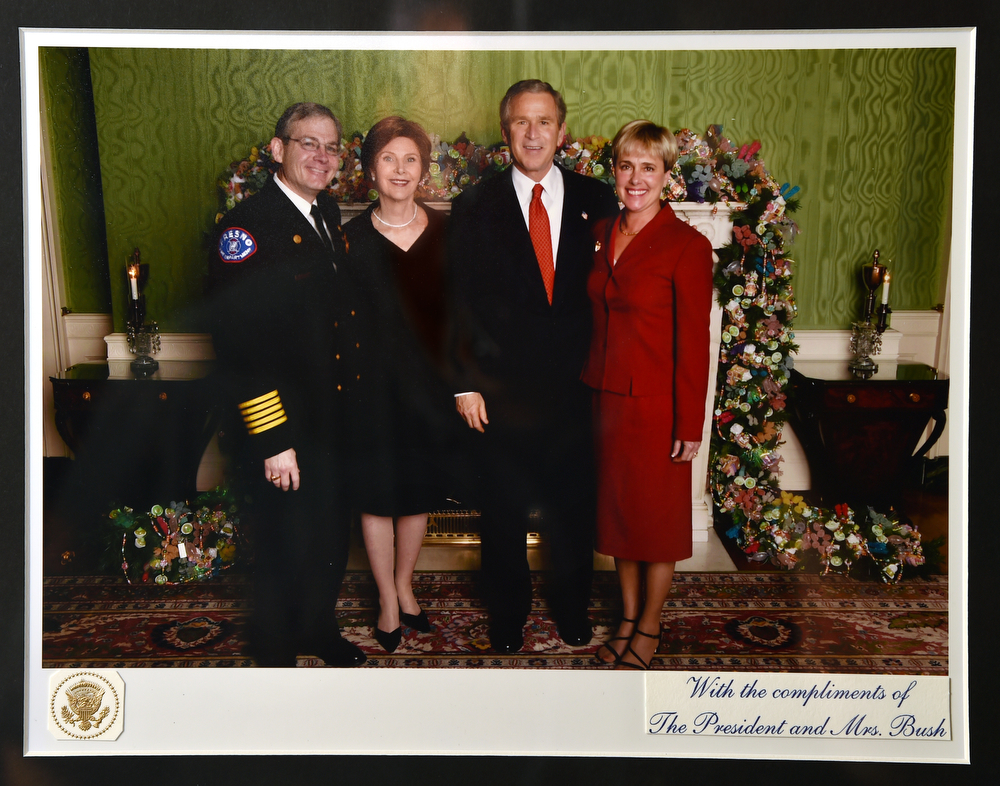
International Association of Fire Chiefs (IAFC) President and and then Fresno Fire Chief Randy Bruegman and his wife, Susan Bruegman, with President George W. Bush and First Lady Laura Bush in a 2003 photo displayed on the wall in Bruegman’s office.
Anaheim Fire & Rescue, in addition to inventive campaigns such as using goats to help clear vegetation to reduce the risk of brush fires, is also promoting research into the possibility of adding vegetation sprinkler systems to high-risk hillsides, and installing a camera in high-risk areas to provide real-time information on conditions if a fire occurs.
“Not only are we prepared better to respond in the event we have an incident,” Bruegman said, “but I think we’ve also done a much better job at saying why don’t we control our risk? So, we’re doing that.”
The biggest challenge during his tenure, Bruegman said, has been the economy. During the recession, the agency took two companies (24 firefighters) out of service, and since has been able to hire just three back.
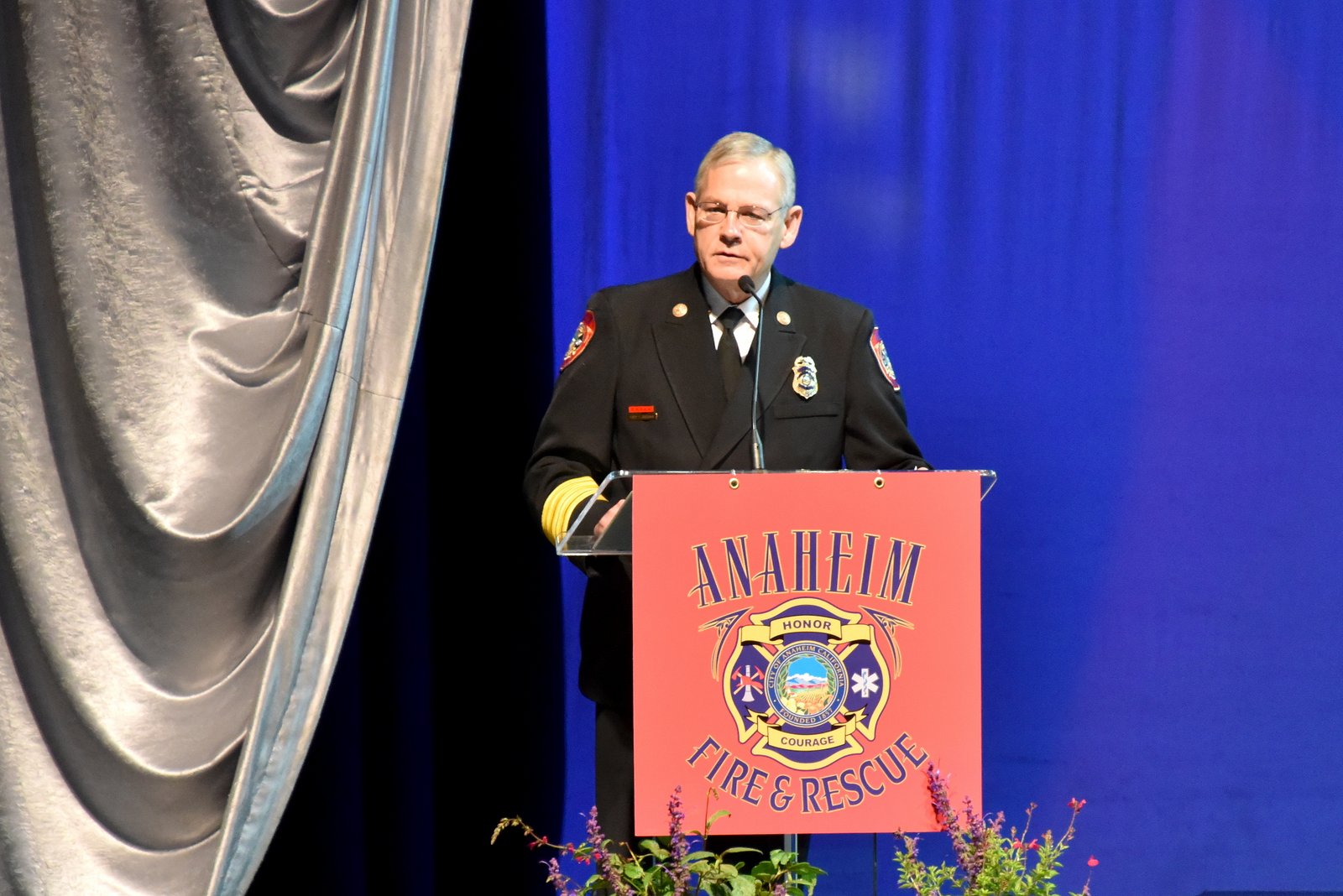
Anaheim Fire & Rescue Chief Randy Bruegman speaks to the public.
Photo provided by Anaheim Fire & Rescue Chief Randy Bruegman
“The entire city, we’re doing more now with less employees than we’ve had since the recession, while at the same time the population has increased and the number of visitors to Anaheim is over 25 million people a year, coming to the city for all the great attractions that we have,” he said.
“Not only for us but (for) every department in the city, it’s been really challenging just to keep up with all that,” Bruegman said. “I’m hopeful that at some point in the future that will level off and we can start to increase the number of on duty each day, increase our fire inspectors, and add staff back to all city departments, so that we may continue to meet the demands for service that are ever increasing in the city.”

Anaheim Fire & Rescue Chief Randy Bruegman speaks to a reporter from ABC7.
Photo provided by Anaheim Fire & Rescue Chief Randy Bruegman
Leading into his retirement, Bruegman is working on a succession plan to help support the next chief and creating an updated draft of the strategic plan for the agency, which the new chief can finalize.
Come December, Bruegman, his wife, Susan, and his drum set (Bruegman is an avid drummer) will be moving to Madison, Wisconsin to be near two of his three children as well as two grandchildren.
“I’ve felt really blessed to be part of this career,” Bruegman said. “I’ve had some of the most incredible experiences, and hope that I have had an influence on our profession.”

Anaheim Fire & Rescue Chief Randy Bruegman plays the drums, one of his passions outside of the fire service.
Photo provided by Anaheim Fire & Rescue Chief Randy Bruegman

Anaheim Fire & Rescue Chief Randy Bruegman with his wife, Susan Bruegman, board chairperson for the Orange County Family Justice Center Foundation at the foundation’s fundraiser.
Photo by Steven Georges/Behind the Badge
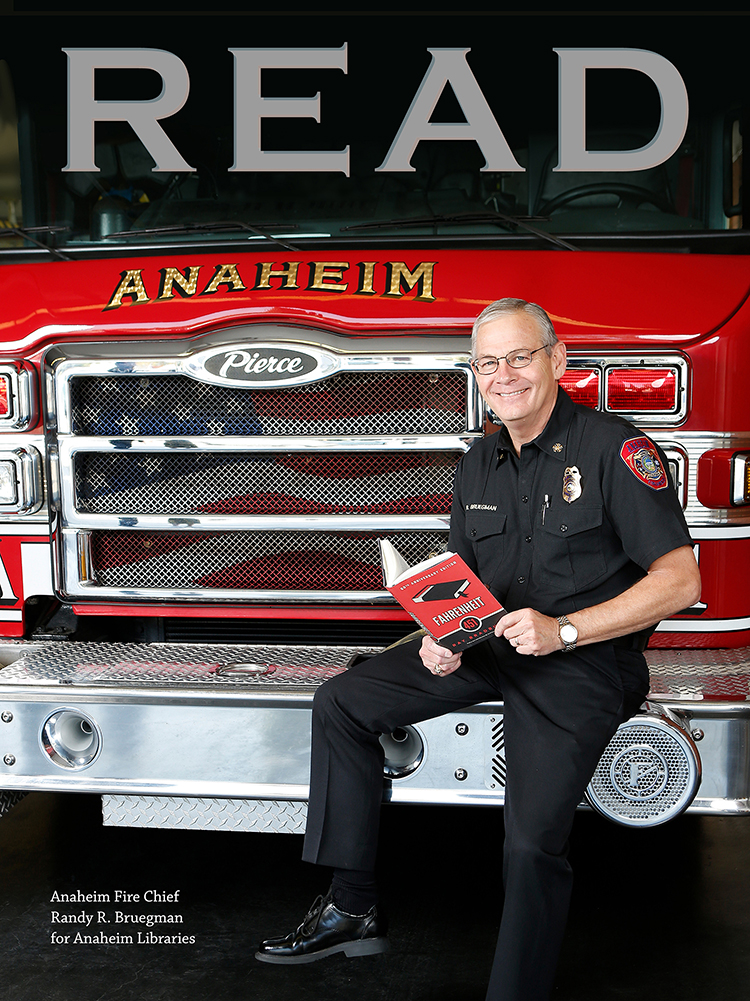
Anaheim Fire & Rescue Chief Randy Bruegman participates in an Anaheim Libraries outreach program encouraging reading.
Photo provided by Anaheim Fire & Rescue Chief Randy Bruegman
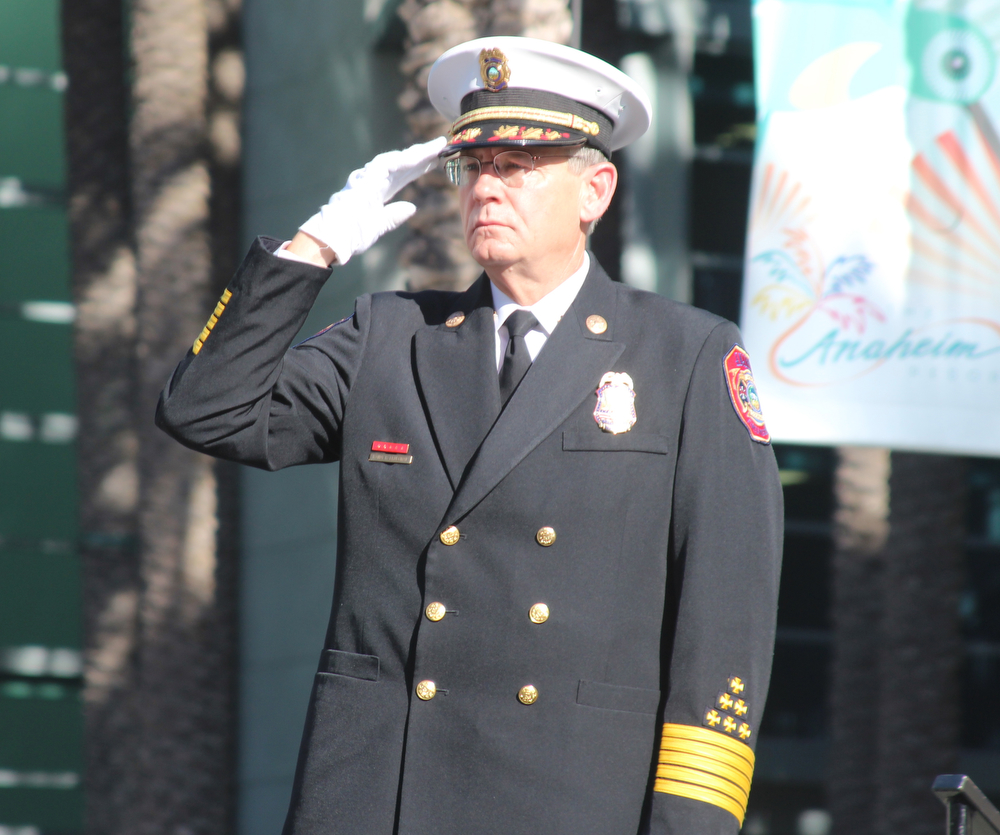
Anaheim Fire & Rescue Chief Randy Bruegman gives a salute.
Photo provided by Anaheim Fire & Rescue Chief Randy Bruegman
 Behind the Badge
Behind the Badge
